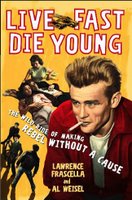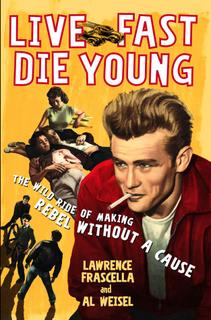 Here is an excerpt from the first chapter of Live Fast, Die Young: The Wild Ride of Making Rebel Without a Cause:
Here is an excerpt from the first chapter of Live Fast, Die Young: The Wild Ride of Making Rebel Without a Cause:Chapter One: Birth of a Rebel
In the early 1950s, director Nicholas Ray was a regular at the classic Saturday night parties thrown by actress Betsy Blair and her husband, Gene Kelly -- the kind of exclusive Hollywood soirees that would find Judy Garland singing at the piano, Leonard Bernstein playing charades or Greta Garbo sitting casually on the edge of the Kellys' kitchen sink. Blair remembers the tall, handsome, seductive Ray with great fondness. "He was always lively and iconoclastic and full of serious opinions," says Blair, who calls him "a Melville hero" for the way he chased dream projects and battled against the confines of the studio system. Blair knew Ray to be a compulsive womanizer, gambler and drinker, although "never a sloppy drunk." But one night in July 1951, after their weekly party broke up, Blair and Kelly looked out their front window and encountered a bizarre sight.
"There was a little slope in front of our house," says Blair, "and I remember Nick leaving and instead of getting into his car, he sank onto the grass, just sort of lying there. I was ready to go out and get him. But Gene said, 'Let's see if he gets up again.' And so we waited, fifteen to twenty minutes. I think Nick was actually planning to lie there all night. Eventually, we did go out and get him." Like everyone else in Hollywood, the Kellys knew that Ray had just filed for divorce from his second wife, the quintessential film noir blonde, Gloria Grahame, after a stormy three-year marriage, but they had no idea what precipitated the separation. "We didn't know in the beginning what had happened," says Blair, "just that they were fighting and breaking up and that he was desperate. And then, when I found out, it was hard to believe." The real story behind the breakup was shocking even by Hollywood standards.
Earlier that summer, everything seemed to be going well for Ray. In June 1951, he signed a lucrative contract with RKO Pictures, negotiated by his powerful new agents at MCA, making him RKO head Howard Hughes's right-hand man. That year, with the red-baiting McCarthy hearings getting under way in Washington and the Rosenbergs on trial in New York, having a protector like Hughes gave Ray -- who had a history of leftist affiliations -- a security and stability he rarely felt in his peripatetic career. Hughes kept him busy that summer doing uncredited patch-up work on such potential RKO disasters as The Racket and Josef von Sternberg's Macao.
One afternoon late in June, Tony, Ray's thirteen-year-old son from his first marriage to journalist Jean Evans, unexpectedly appeared on the doorstep of the Malibu beach house Ray was renting next door to his close friend, producer John Houseman. On vacation from military school, Tony had made the three-thousand-mile journey from New York all by himself, without telling anyone he was coming. Ray was not home when Tony showed up, so Grahame, who had met Ray's son only once, when he was ten years old, invited him inside. When Ray arrived home later that afternoon, he walked into the bedroom and stumbled on a sight almost too outrageous to believe. . . . Read more here
Rebel Without a Cause, James Dean, Nicholas Ray, Gloria Grahame, Natalie Wood, Sal Mineo, Film, Movies, Books, Movie, Book


1 comment:
Nice to be on the inside as an "outsider" to get movies made. I found that out, as an outsider/outsider. But fuck it, I still make movies for cable anyway. :)
Post a Comment